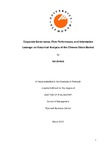Corporate Governance, Firm Performance, and Information Leakage: an Empirical Analysis of the Chinese Stock Market
| dc.contributor.supervisor | Farrar, Sue | |
| dc.contributor.author | Zhang, Hui | |
| dc.contributor.other | Plymouth Business School | en_US |
| dc.date.accessioned | 2012-03-26T14:17:51Z | |
| dc.date.available | 2012-03-26T14:17:51Z | |
| dc.date.issued | 2012 | |
| dc.identifier | 10022313 | en_US |
| dc.identifier.uri | http://hdl.handle.net/10026.1/922 | |
| dc.description.abstract |
The purpose of this thesis is to analyse the effect of corporate governance on firm performance and information leakage in the Chinese securities market. As one of the major emerging markets in the world, the results of this thesis are valuable not only to the Chinese market, but also to other emerging markets. To achieve this purpose, data is collected from most of the non-financial listed companies in the two Chinese stock exchanges, which are the Shanghai Stock Exchange and the Shenzhen Stock exchange. The data sample covers the period from 2004 to 2008, since there was a series of new reforms in the Chinese stock market at that time. These reforms include new legislation and the reduction of non-tradable shares. Then this thesis employs the panel technique and the pooled OLS to estimate the effect of corporate governance on firm performance and information leakage in Chinese listed companies. Firstly the relationship between corporate governance and firm performance in Chinese companies is empirically evaluated. The empirical results of this thesis find that the ownership structure of Chinese companies will affect their firm performance. In this thesis, proxies of ownership structure include the proportion of institutional ownership, the proportion of the state ownership, the proportion of shareholdings of the largest shareholder, and the proportion of tradable shares in Chinese companies. A greater proportion of institutional ownership has positive effects on firm performance in Chinese companies. Board subcommittees also help Chinese companies to increase firm performance. The market reforms of 2006 also help Chinese companies to increase their firm performance. However, the board of directors and board of supervisors do not affect firm performance in Chinese companies. Secondly, information leakage in the Chinese Stock Market is empirically assessed. If investors receive corporate material information before the public disclosure, this phenomenon is known as information leakage. The thesis finds that information leakage in the Chinese market is widespread. Finally, the thesis empirically examines the effects of corporate governance on information leakage in Chinese companies. Board subcommittees have negative effects on information leakage in Chinese companies. Other variables of corporate governance do not affect information leakage in Chinese companies. Additionally, the thesis finds that market reform promotes more information leakage in Chinese market. On the basis of the empirical results, the thesis provides the following recommendations. First, the Chinese Stock Market needs to reform the relevant legislation. Second, Chinese companies need to reform their ownership structure. These suggestions may strengthen the internal governance of Chinese listed companies, thereby, increasing firm performance and decrease information leakage. | en_US |
| dc.language.iso | en | en_US |
| dc.publisher | University of Plymouth | en_US |
| dc.subject | Corporate Governance | en_US |
| dc.subject | Firm Performance | |
| dc.subject | Information Leakage | |
| dc.subject | China, Securities Market | |
| dc.title | Corporate Governance, Firm Performance, and Information Leakage: an Empirical Analysis of the Chinese Stock Market | en_US |
| dc.type | Thesis | |
| dc.identifier.doi | http://dx.doi.org/10.24382/3326 | |
| dc.identifier.doi | http://dx.doi.org/10.24382/3326 |
Files in this item
This item appears in the following Collection(s)
-
01 Research Theses Main Collection
Research Theses Main


